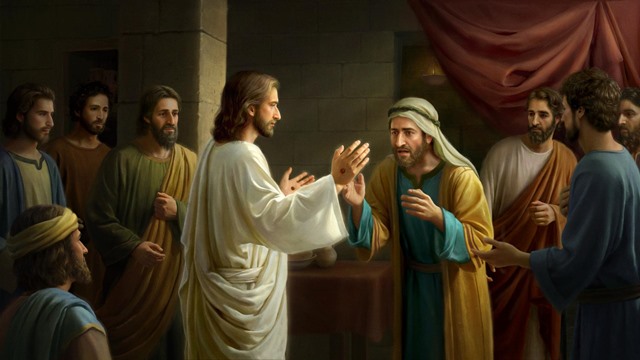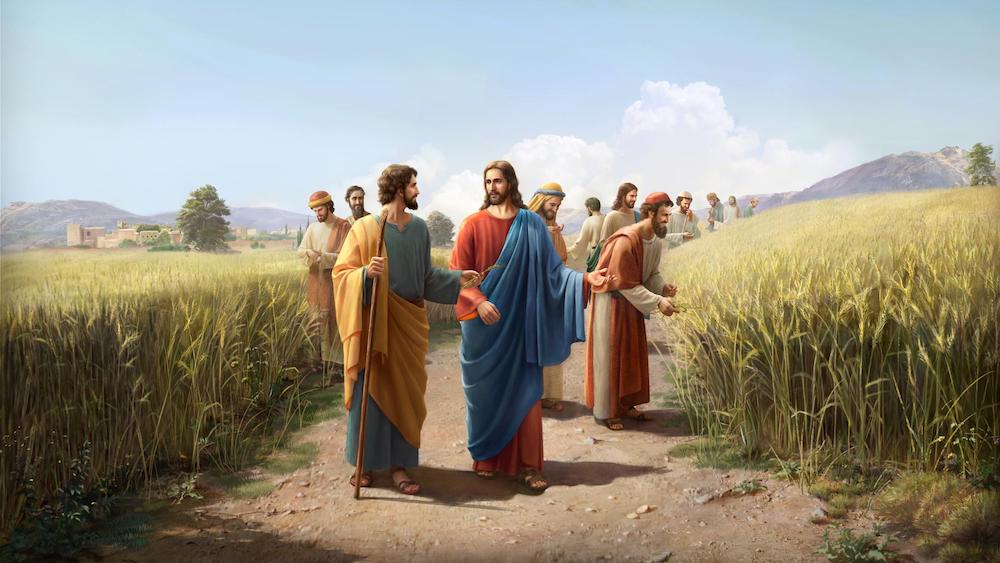Jesus Eats Bread and Explains the Scriptures After His Resurrection
13. Jesus Eats Bread and Explains the Scriptures After His Resurrection
Luk 24:30–32 And it came to pass, as He sat at meat with them, He took bread, and blessed it, and broke, and gave to them. And their eyes were opened, and they knew Him; and He vanished out of their sight. And they said one to another, Did not our heart burn within us, while He talked with us by the way, and while He opened to us the scriptures?
14. The Disciples Give Jesus Broiled Fish to Eat
Luk 24:36–43 And as they thus spoke, Jesus Himself stood in the middle of them, and said to them, Peace be to you. But they were terrified and affrighted, and supposed that they had seen a spirit. And He said to them, Why are you troubled? and why do thoughts arise in your hearts? Behold My hands and My feet, that it is I Myself: handle Me, and see; for a spirit has not flesh and bones, as you see Me have. And when He had thus spoken, He showed them His hands and His feet. And while they yet believed not for joy, and wondered, He said to them, Have you here any meat? And they gave Him a piece of a broiled fish, and of an honeycomb. And He took it, and did eat before them.
Next, we will take a look at the passages of scripture above. The first passage is a recounting of the Lord Jesus eating bread and explaining the scriptures after His resurrection, and the second passage is a recounting of the Lord Jesus eating a broiled fish. How do these two passages help you to know God’s disposition? Can you imagine the kind of picture you get from these descriptions of the Lord Jesus eating bread and then a broiled fish? Can you imagine, if the Lord Jesus were standing in front of you eating bread, how you might feel? Or if He were eating at the same table with you, eating fish and bread with people, what kind of feeling you would have in that moment? If you would feel very close to the Lord, that He is very intimate with you, then this feeling is right. This is exactly the result that the Lord Jesus wanted to bring about by eating bread and fish in front of the gathered people after His resurrection. If the Lord Jesus had only spoken with people after His resurrection, if they could not feel His flesh and bones, but instead felt Him to be an unreachable Spirit, how would they have felt? Would they not have been disappointed? Feeling disappointed, would the people not have felt abandoned? Would they not have felt a distance between themselves and the Lord Jesus Christ? What kind of negative impact would this distance have created on people’s relationship with God? People would certainly have felt afraid, that they dared not come close to Him, and thus they would have had an attitude of keeping Him at a respectful distance. From then on, they would have severed their intimate relationship with the Lord Jesus Christ and returned to a relationship between mankind and God up in heaven as it was before the Age of Grace. The spiritual body that people could not touch or feel would have brought about the eradication of their intimacy with God, and it would also have caused that intimate relationship, established during the Lord Jesus Christ’s time in the flesh, with no distance between Him and humans, to cease to exist. The only things that were stirred in people by the spiritual body were feelings of fear, avoidance, and a wordless gaze. They would not have dared to get close or to engage in dialogue with Him, let alone follow, trust, or look up to Him. God did not wish to see this type of feeling that humans had for Him. He did not want to see people avoiding Him or removing themselves from Him; He only wanted people to understand Him, come close to Him, and to be His family. If your own family, your children, saw you but did not recognize you, and did not dare to come close to you but always avoided you, if you could not gain their understanding for everything you had done for them, how would that make you feel? Would it not be painful? Would you not be heartbroken? That is precisely what God feels when people avoid Him. So, after His resurrection, the Lord Jesus still appeared to people in His form of flesh and blood, and still ate and drank with them. God sees people as family, and God also wants mankind to see Him as the One dearest to them; only in this way can God truly gain people, and only in this way can people truly love and worship God. Now can you understand My intention in extracting these two passages of scripture in which the Lord Jesus eats bread and explains the scriptures after His resurrection, and in which the disciples give Him a broiled fish to eat?
It can be said that earnest thought had been put into the series of things that the Lord Jesus said and did after His resurrection. These things were full of the kindness and affection that God held toward humanity, and full also of the cherishment and meticulous care He had for the intimate relationship He had established with mankind during His time in the flesh. Even more, they were full of the nostalgia and the longing He felt for His life of eating and living together with His followers during His time in the flesh. So, God did not want people to feel a distance between God and man, and nor did He want mankind to distance themselves from God. Even more, He did not want mankind to feel that the Lord Jesus after His resurrection was no longer the Lord who had been so intimate with people, that He was no longer together with mankind because He had returned to the spiritual world, returned to the Father whom people could never see or reach. He did not want people to feel that any difference in status had arisen between Him and mankind. When God sees people who want to follow Him but who keep Him at a respectful distance, His heart is in pain because that means that their hearts are very far from Him and that it will be very difficult for Him to gain their hearts. So if He had appeared to people in a spiritual body that they could not see or touch, this would have once again distanced man from God, and it would have led mankind to mistakenly see Christ after His resurrection as having become lofty, of a different kind than humans, and someone who could no longer share a table and eat with man because humans are sinful, filthy, and can never draw close to God. In order to dispel these misunderstandings of mankind, the Lord Jesus did a number of things that He used to do in the flesh, as recorded in the Bible: “He took bread, and blessed it, and broke, and gave to them.” He also explained the scriptures to them, as He used to do in the past. All of these things that the Lord Jesus did made every person who saw Him feel that the Lord had not changed, that He was still the same Lord Jesus. Even though He had been nailed to the cross and had experienced death, He had been resurrected, and had not left mankind. He had returned to be among humans, and nothing about Him had changed. The Son of man standing in front of people was still the same Lord Jesus. His demeanor and His way of conversing with people felt so familiar. He was still so full of lovingkindness, grace, and tolerance—He was still the same Lord Jesus who loved others as He loved Himself, who could forgive mankind seventy times seven. As He always had before, He ate with people, discussed the scriptures with them, and even more importantly, just as before, He was made of flesh and blood and could be touched and seen. The Son of man as He was allowed people to feel intimacy, to feel at ease, and to feel the joy of regaining something that had been lost. With great ease, they bravely and confidently began to rely on and look up to this Son of man who could forgive mankind of their sins. They also began to pray in the name of the Lord Jesus without hesitation, to pray to obtain His grace, His blessing, and to obtain peace and joy from Him, to gain care and protection from Him, and they began to heal the sick and cast out demons in the name of the Lord Jesus.
During the time that the Lord Jesus worked in the flesh, most of His followers could not fully verify His identity and the things that He said. When He was approaching the cross, the attitude of His followers was one of observing. Then, from the time when He was nailed to the cross until He was put into the grave, people’s attitude toward Him was disappointment. During this time, people had already begun to move in their hearts from doubting the things the Lord Jesus had said during His time in the flesh to denying them altogether. Then, when He walked out from the grave and appeared to people one by one, the majority of those who saw Him with their own eyes or heard the news of His resurrection gradually shifted their attitude from denial to skepticism. Only when the Lord Jesus had Thomas put his hand into His side, and when He broke bread and ate it in front of the crowd after His resurrection and then proceeded to eat a broiled fish in front of them, did they truly accept the fact that the Lord Jesus was Christ in the flesh. You could say that it was as if this spiritual body of flesh and blood standing before those people was awakening every one of them from a dream: The Son of man standing in front of them was the One who had existed since time immemorial. He had a form, and flesh and bones, and He had already lived and eaten alongside mankind for a long time…. At this time, the people felt that His existence was so real, and so wonderful. At the same time, they were also so joyful and happy and filled with emotion. His reappearance allowed people to truly see His humility, to feel His closeness and attachment to mankind, and to feel how much He thought about them. This brief reunion made the people who saw the Lord Jesus feel as if a lifetime had passed. Their lost, confused, afraid, anxious, yearning and numb hearts found comfort. They were no longer doubtful or disappointed, because they felt that now there was hope and something to rely on. The Son of man then standing before them would be their rear guard for all time; He would be their strong tower, their refuge for all eternity.
Although the Lord Jesus was resurrected, His heart and His work had not left mankind. By appearing to people, He told them that no matter what form He existed in, He would accompany people, walk with them, and be with them at all times and in all places. He told them that at all times and in all places He would provide for mankind and shepherd them, allow them to see and touch Him, and ensure they never again felt helpless. The Lord Jesus also wanted people to know that they do not live alone in this world. Mankind has God’s care; God is with them. They can always lean on God, and He is family to every one of His followers. With God to lean on, mankind will no longer be lonely or helpless, and those who accept Him as their sin offering will no longer be bound in sin. In human eyes, these portions of His work that the Lord Jesus carried out after His resurrection were very small things, but the way I see it, every single thing He did was so meaningful, so valuable, so important and heavily laden with significance.
Although the Lord Jesus’ time of working in the flesh was full of hardships and suffering, He completely and perfectly accomplished His work of that time in the flesh to redeem mankind through His appearance in His spiritual body of flesh and blood. He began His ministry by becoming flesh, and He concluded His ministry by appearing to mankind in His fleshly form. He heralded the Age of Grace, beginning the new age through His identity as Christ. Through His identity as Christ, He carried out work in the Age of Grace and He strengthened and led all of His followers in the Age of Grace. It can be said of God’s work that He truly finishes what He starts. There are steps and a plan, and the work is full of His wisdom, His omnipotence, His marvelous deeds, and His love and mercy. Of course, the main thread running through all of God’s work is His care for mankind; it is permeated with His feelings of concern that He can never put aside. In these verses of the Bible, in every single thing that the Lord Jesus did after His resurrection, God’s unchanging hopes and concern for mankind were revealed, as were His meticulous care and cherishing of mankind. None of this has ever changed, all the way to the present day—can you see it? When you see this, do your hearts not unconsciously draw closer to God? If you lived in that age and the Lord Jesus appeared to you after His resurrection in a tangible form for you to see, and if He sat in front of you, ate bread and fish and explained the scriptures to you and spoke with you, then how would you feel? Would you feel happy? Or would you feel guilty? The previous misunderstandings and avoidance of God, the conflicts with and doubts of God—would they not all just disappear? Would the relationship between God and man not become more normal and proper?
By interpreting these limited chapters of the Bible, do you find any flaws in God’s disposition? Do you find any adulteration of God’s love? Do you see any deceit or evil in God’s omnipotence or wisdom? Certainly not! Now can you say with certainty that God is holy? Can you say with certainty that each of God’s emotions is a revelation of His essence and disposition? I hope that after you have read these words, the understanding you gain from them will help you and bring you benefits in your pursuit of a change in disposition and a fear of God, and that they will bear fruit in you, fruit that grows by the day, so that in the process of this pursuit you will be brought closer and closer to God, closer and closer to the standard that God requires. You will no longer be bored of the pursuit of the truth and will no longer feel that the pursuit of the truth and of a change in disposition is a troublesome or a superfluous thing. Rather, motivated by the expression of God’s true disposition and the holy essence of God, you will long for the light, long for justice, aspire to pursue the truth, to pursue the satisfaction of God’s will, and you will become a person gained by God, become a real person.
Today we have talked about certain things that God did in the Age of Grace when He was made incarnate for the first time. From these things, we have seen the disposition that He expressed and revealed in the flesh, as well as every aspect of what He has and is. All these aspects of what He has and is seem very humanized, but the reality is that the essence of all that He revealed and expressed is inseparable from His own disposition. Every method and every aspect of God incarnate expressing His disposition in humanity is inextricably linked with His own essence. So, it is very important that God came to mankind using the way of incarnation. Also important is the work that He did in the flesh, but even more important to every person living in the flesh, to every person living in corruption, are the disposition that He revealed and the will that He expressed. Is this something that you are able to understand? After understanding God’s disposition and what He has and is, have you made any conclusions as to how you should treat God? Finally, in response to this question, I would like to give you three pieces of counsel: First, do not test God. No matter how much you understand about God, no matter how much you know about His disposition, absolutely do not test Him. Second, do not contend for status with God. No matter what type of status God gives you or what kind of work He entrusts you with, no matter what kind of duty He raises you up to perform, and no matter how much you have expended yourself and sacrificed for God, absolutely do not compete for status with Him. Third, do not compete with God. No matter whether you understand or if you can submit to what God does with you, what He arranges for you, and the things He brings to you, absolutely do not compete with God. If you can abide by these three pieces of counsel, then you will be quite safe, and you will not be prone to angering God.
Excerpted from “God’s Work, God’s Disposition, and God Himself III” in The Word Appears in the Flesh





